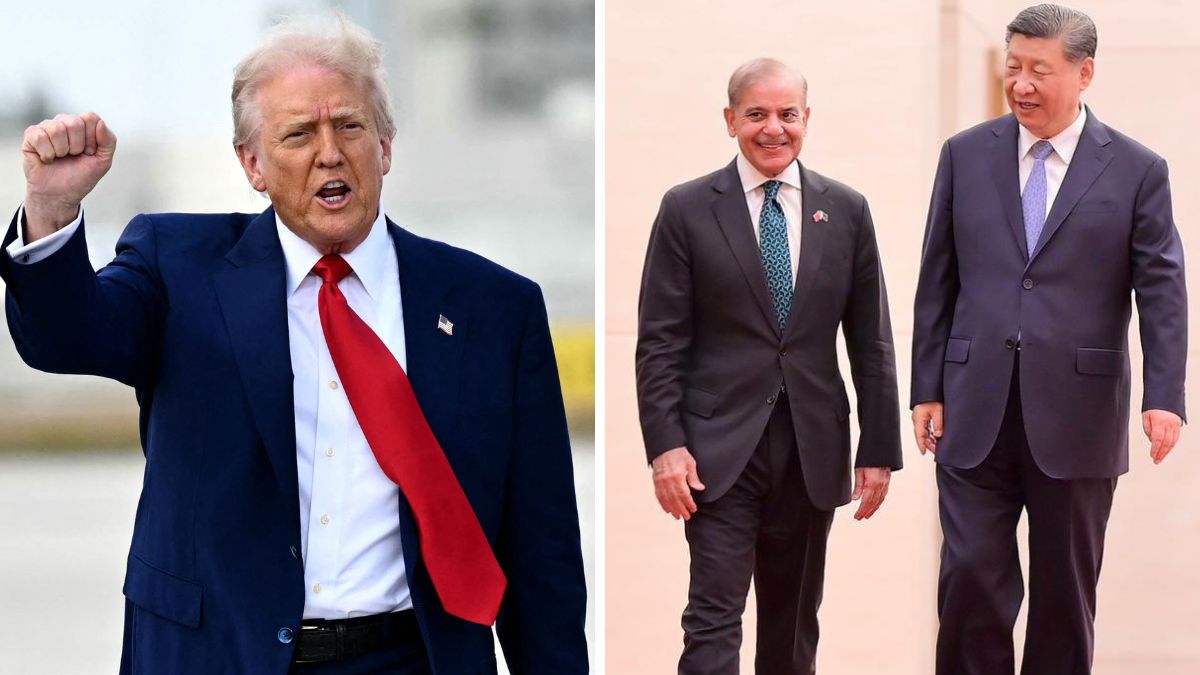Five reasons why China is worried about ‘all-weather friend’ Pakistan’s sudden closeness with Trump
 US President Donald Trump. (Right) Pakistan Prime Minister Shehbaz Sharif with Chinese President Xi Jinping | X
US President Donald Trump. (Right) Pakistan Prime Minister Shehbaz Sharif with Chinese President Xi Jinping | X
A month after US President Donald Trump hosted Pakistan Army Chief Asim Munir for a private luncheon at the White House, the country’s Deputy Prime Minister Ishaq Dar is heading to the US to meet Secretary of State Marco Rubio. This could be the first time a Pakistani civilian leader meets with the top diplomat from the Trump administration.
The trip comes amid the US’s sudden recalibration of relations with Pakistan, amid years of neglect under Trump’s first term and Joe Biden.
While India expectedly registered its protest with the US for hosting Munir, the newfound warmth in US-Pakistan relations has ruffled feathers in Beijing too, according to analyst Antara Ghosal Singh with Observer Research Foundation.
Singh claims Pakistan’s endorsement of Donald Trump for the Nobel Peace Prize has triggered public outrage in China, which was seeking to mobilise global public opinion against “Trump’s tariff tyranny”, branding him “the destroyer of the global order”.
According to Chinese commentators, Pakistani military officers flew Chinese fighter jets to guard the country’s airspace, but in the end, laid the credit on the American altar.
The Chinese commentators ’concerns over the sudden warming up of Pakistan-US ties under President Trump are the following:
1) Will the US sabotage CPEC?- In her article, Singh argues that Beijing fears that the China-Pakistan Economic Corridor (CPEC) could be sabotaged. The CPEC, a lifeline for China, was envisioned to connect Pakistan’s Gwadar Port to Afghanistan's Khyber Pass, bypassing the Strait of Malacca. China fears the US could infiltrate the plan.
2) Will Trump pry into China’s military intel? Asim Munir’s meeting with Trump has stoked fears in Beijing that he could try and pry into the latest military insider information about China's weapons and combat systems used during the India-Pakistan air war.
3) Will the US disrupt China’s Middle East policy? Beijing fears the US could lure Pakistan into standing against Iran. If that’s the case, the Islamic world’s only nuclear-armed country could dismantle China’s anti-Israel stance, the analyst mentions in her article.
4) Will the US-Pakistan cryptocurrency alliance affect China's digital currency layout in South Asia? Some Chinese observers feel the US could make Islamabad into a South Asian encryption centre. This may weaken the cross-border settlement status of the RMB in Pakistan, hinder China's digital currency layout in South Asia, divert energy resources from the China-Pakistan Economic Corridor (CPEC), and threaten China's overall strategic layout in Pakistan.
5) Will the US hurt China-Pakistan relations? China feels threatened that Pakistan’s sudden "opportunistic" turnaround could hurt the “core pillar of China-Pakistan relations一strategic mutual trust.”
World